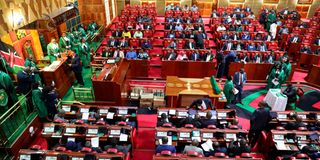MPs not ready to let go of CDF

MPs take the oath of office at the National Assembly on September 8, 2022. The problem is not that it actually gobbles up a huge chunk of the country’s resources; the problem is who controls those resources. Legislators have always fought, and are still fighting, to take charge of the CDF fund.
The Constituency Development Fund has had a chequered history since its inception in 2003 and its first amendment in 2013. It is the revenue meant to be distributed by the National Treasury to the constituencies to support development projects at the grassroots as prioritised by the people.
Its main aim was to combat poverty through such beneficial projects and also ensure the least bestowed constituencies caught up with those better off.
The fund was supposed to help in building new health facilities, schools and water projects. In large measure, the CDF has done well in ensuring some level of equitable development countrywide, but in certain areas, it has failed dismally.
The problem is not that it actually gobbles up a huge chunk of the country’s resources; the problem is who controls those resources. Legislators have always fought, and are still fighting, to take charge of this fund.
Enormous influence
For 10 years, they appointed members of the CDF committees that were supposed to develop project proposals in consultation with constituents, meaning that they had an enormous influence on what projects were implemented and where.
The result was that too often, the fund was used by the legislators to further their own political goals. Those wards that did not give them enough votes were deliberately neglected. They did so by ensuring the chairmen of their CDF committees were their loyalists or family members.
That way, some areas of a constituency were starved of any development. I have a personal experience on this one. A year ago, a primary school in my locality came under scrutiny when it was discovered that its latrines’ doors were only held upright by a miracle, its floor had no viable means of support, and its walls had gaping holes.
One question persisted: If CDF cash could not be used to renovate a school latrine, where did the money go? Luckily, the local MP didn’t have to answer this question for he had higher things in mind, and is now a Cabinet Secretary.
Anyway, to get back to the point, on August 8 the Supreme Court declared the CDF unconstitutional after a long court battle between legislators and a few civil society organisations, a dispute that went all the way to the High Court and the Court of Appeal.
The main ground of contention was that MPs could not carry out their legislative roles and at the same manage CDF, because to do so violated the principle of separation of powers.
Instead, the Supreme Court ruled, only county governments should carry out such projects.
However, the MPs are not prepared to take this setback as a defeat, and in this, they have support from the highest quarters.
During his inauguration, President William Ruto advised them to protect CDF by aligning it to the Constitution.
Active participation
Later, former House Speaker J. B. Muturi told them: “It is possible for the CDF to exist without the active participation of MPs. There is a need to amend the law to have the public and other arms of government manage it.”
He may as well have been telling it to the birds. In response, two Bills have been tabled in Parliament seeking to amend the Constitution to entrench the CDF and two other funds.
Further, they want the CDF allocation doubled from 2.5 per cent to five per cent of the national government revenue. This is perhaps why Senate Speaker Amason Kingi promises that Parliament will “adopt a coordinated approach in amending the CDF laws to ensure they meet the dictates of the Constitution.”
From all this, it is clear that MPs are not about to cede control of CDF to any other entity. Indeed, this became clear on Wednesday when MPs from both sides of the divide united in calling on the Treasury to release the Fund, using sophistry, chest-thumping, and threats to get their own way by circumventing a clear Supreme Court ruling.
* * * *
Two momentous things happened in America this week; Former President Donald Trump announced he will run again in 2024, and, secondly, many of his former staunch supporters ostensibly withdrew their backing rather irreverently. Mr Trump could not, in his wildest imagination, have expected a newspaper like the New York Post to foist on him the unflattering moniker, Toxic Trump, but it did.
For a man who always delighted in giving his opponents disparaging nicknames he coined up and dispersed in viral tweets, this must have been a bitter pill to swallow.
Even more unpalatable was that the paper is owned by Rupert Murdoch, who also owns the Fox News TV channel, Mr Trump’s favourite news outlet. His detractors accuse him of endorsing weak candidates, leading to the Republican Party’s losses during the midterm elections.
Whether Americans are fed up with Mr Trump will only become clear during nominations. In the event that he is picked, the Democrats will celebrate because they believe he will again be soundly thrashed by President “Sleepy Joe” Biden. Whatever the case, his entry into the fray will inevitably roil the waters, and it will be sad to watch the world’s greatest democracy again writhe in political turmoil.
Mr Ngwiri is a consultant editor; [email protected]





